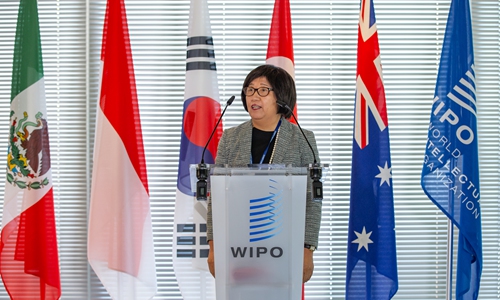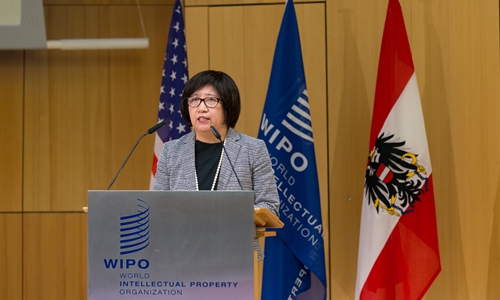HOME >> CHINA
Why is China's candidate, Wang Binying, best for the WIPO?
By Cong Ge Source:Global Times Published: 2020/2/28 15:17:43 Last Updated: 2020/2/29 16:43:19

Wang Binying Photo: Courtesy of WIPO
The World Intellectual Property Organization (WIPO) election next week to pick its next director general has clearly been politicized by the US. However, despite its ill intentions, Washington did shed light on a critical issue at the UN agency tasked with overseeing the world's massive intellectual property (IP) system: the election is of vast implications. That is precisely why we have to brush aside toxic politics and focus on candidates' professional merits to elect the best person to lead the agency.
Among the six candidates - from China, Singapore, Colombia, Kazakhstan, Peru and Ghana - competing for the post, Wang Binying of China, who has been working at the WIPO for nearly three decades and is currently its deputy director general, presents a unique expertise and background that could help mitigate challenges the agency faces in improving internal efficiency and expanding external engagement.
Wang is a highly regarded professional in the field with an impeccable resume. Not even US politicians have targeted her professional qualifications. That is telling given that those same politicians have spared no efforts in attempting to deny her candidacy.
Wang holds a Master's degree in Law, including industrial property law, from the University of California (Berkeley), a Diploma in American Law from Columbia Law School in New York, and an English degree from Zhongnan University in Hunan, China.
She joined the WIPO in 1992, where she held a wide variety of positions before being appointed assistant director general in charge of administrative support services in 2006 and deputy director general in charge of the brands and designs sector in 2009. It is fair to say that Wang is well versed in the inner-workings of the WIPO.
As Mark Allen Cohen, a former senior counsel at the US Patent and Trade Mark Office who has known Wang for years, noted in an article on Wednesday, "Wang is eminently technically qualified to lead WIPO… [and] has excellent credentials."
However, Cohen and others have also raised concerns about Wang's candidacy. These concerns have nothing to do with Wang's professional merits. Nonetheless, they should be taken seriously and addressed properly in the spirit of transparency and fairness ahead of the election scheduled for March 4.

Wang Binying Photo; Courtesy of WIPO
Some have argued, given that Wang was nominated by the Chinese government, that she being the director general would give China illegal access to confidential information of the international IP in the Patent Cooperation Treaty (PCT) system.However, as Cohen pointed out in his article, the WIPO does not "mandate international conformity with the nationality of its [director general]." It is meaningless to argue that just because Wang is from China, she would give China illegal access to pending PCT applications as the same could be said about anyone who becomes director general. Additionally, the current and previous deputy director generals of the WIPO in charge of the PCT International Patent System are US nationals. Would it be fair if some were to accuse them of giving the US access to inventions pending review?
Concerns about Wang's candidacy are fueled primarily by the US' unsubstantiated accusations that China stole its technologies and trade secrets through espionage and other means. China has used some US technologies, yes, but through legal market transactions. Just like any other developing or developed country, China has also faced its own fair share of challenges when it comes to protecting IP, but its progress in the area should be clear to any fair-minded person. Today, China is a global innovation leader and needs a robust international IP protection system more than ever. Furthermore, it is also important to note that these US' accusations are entirely irrelevant in discussion about Wang's candidacy because, as Cohen wrote, "many of these policy issues are not within the domain of WIPO."
However, the security of the PCT system is indeed a paramount issue that must be addressed properly. But the solution lies in the WIPO's internal mechanism that oversees the system. If there are loopholes, including allowing the director general too much discretion, they should be closed promptly via internal reforms. That could also be an area where Wang could help immensely because, as assistant director general between 2006 and 2009, she was also in charge of the WIPO's security system.
Another concern raised by some is related to the WIPO's relationship with China. Would Wang, if elected, favor China and turn a blind eye to issues with China's IP policies? Again, such questions are based on accusations that China lacks proper IP protections and is ignorant of the WIPO's mandate. The fact is that China has been intensifying efforts in recent years to enhance IP protections in both legislation and law enforcement.
There is no evidence or reason whatsoever that Wang - who has spent 28 years working at the agency and 17 working in China - cannot perform her job in a professional and impartial manner if elected, just like the heads of all other international organizations who are citizens of different countries around the world.
If anything, Wang's appointment as director general could boost cooperation between the WIPO and China in promoting protections not just in China but around the world. China's experience in creating a robust IP protection system in less than four decades could be of great value to other developing countries. Given Wang's experience working in the multilateral agency for nearly three decades, Wang also possesses a deep understanding of the IP demands of all countries and can push for inclusive and constructive talks to help all sides reach common ground.
The significant extra political attention this election has received shows that improving relations among all member states is a pressing issue for the WIPO, whose most important mission is to facilitate global cooperation. As Cohen noted, by adopting a collaborative and balanced approach, Wang could also help improve the WIPO's relationship with the US. Despite the political differences between China and the US, an balanced and efficient global IP system is in the interests of both China and the US, and of all other member states. Given her educational and professional background, Wang is best equipped to pursue the delicate task of balancing different demands.
Apart from the extensive professional expertise she can bring to the WIPO, Wang, if elected, would also make history. She would be the first female director general in the WIPO's 53-year history. That would also be highly significant at a time when promoting gender equality in the workplace has become an increasingly critical global necessity.
All in all, Wang is a strong candidate for director general of the WIPO. It is hoped that as member states prepare to cast their votes next week, they will consider her professional merits rather than allowing themselves to be clouded by baseless political attacks from the US. Washington has no credibility in this matter as it, under its "America first" agenda, is attempting to dismantle the global governance system wherever it believes its own interests are not placed above those of other countries.
The author is a reporter with the Global Times. bizopinion@globaltimes.com.cn
Posted in: POLITICS